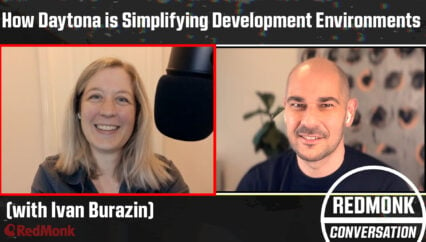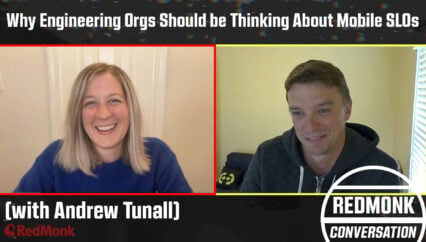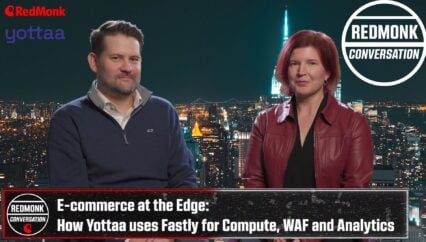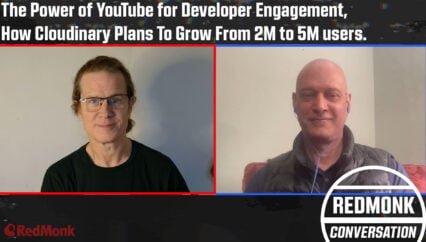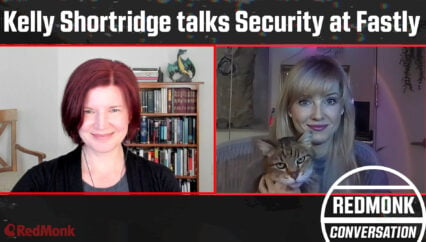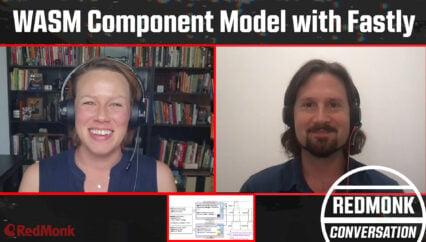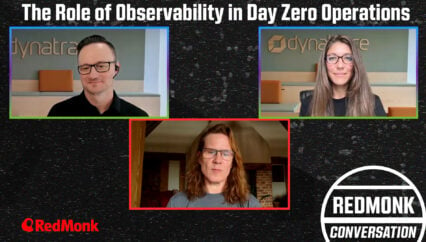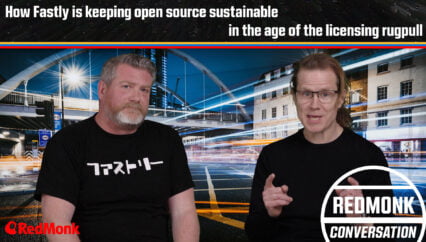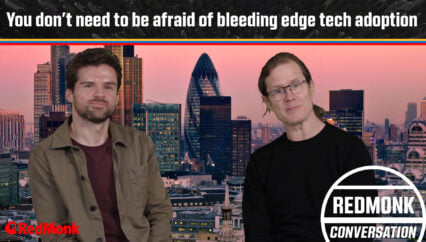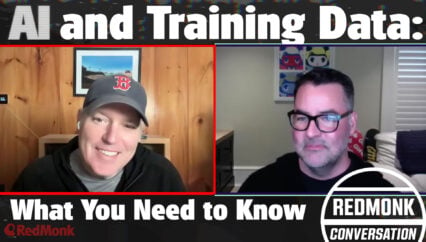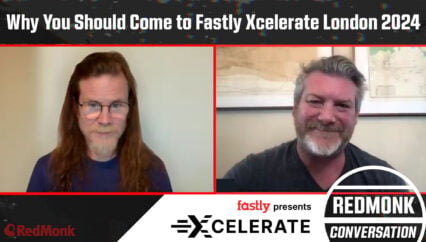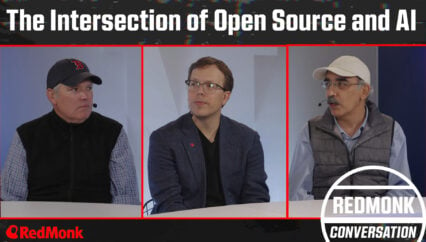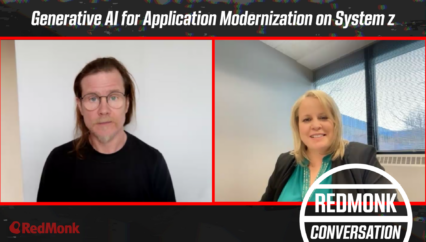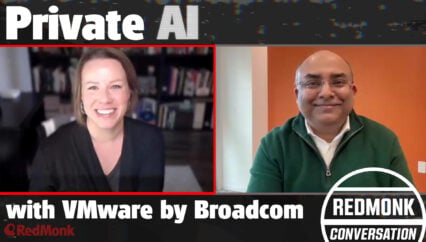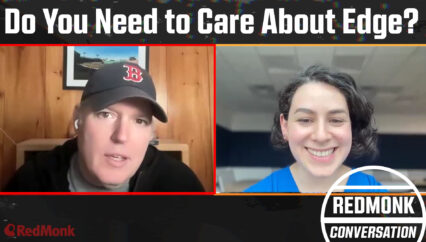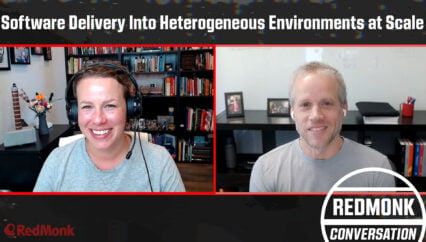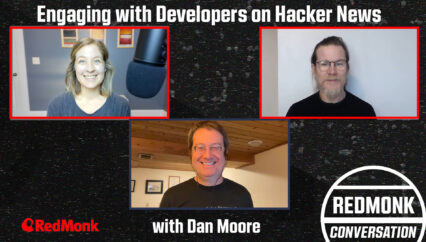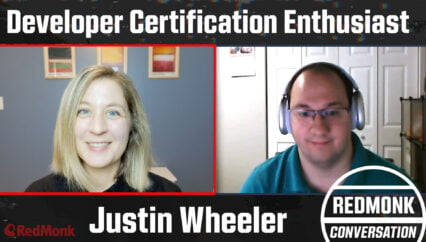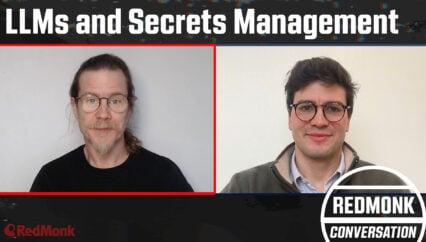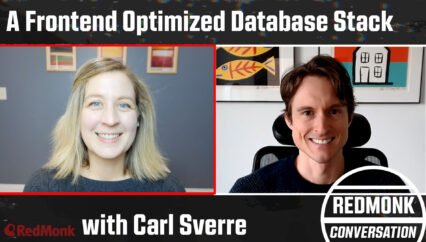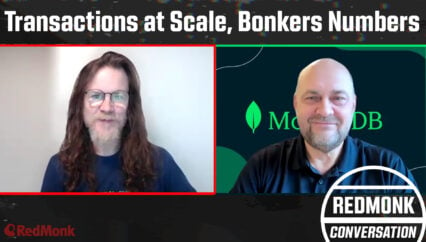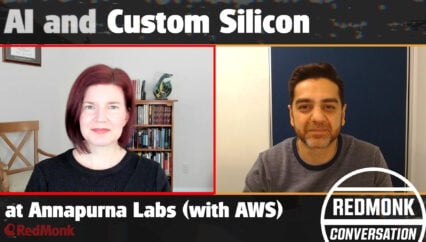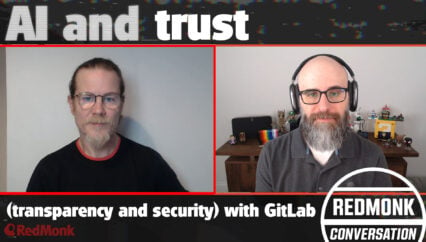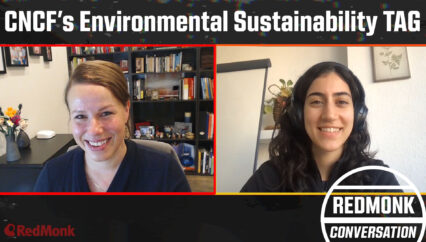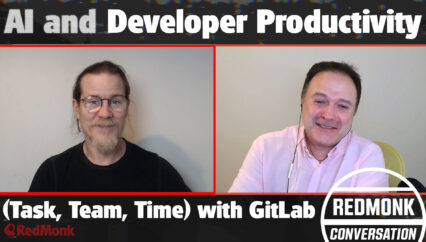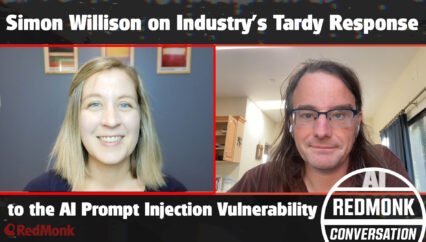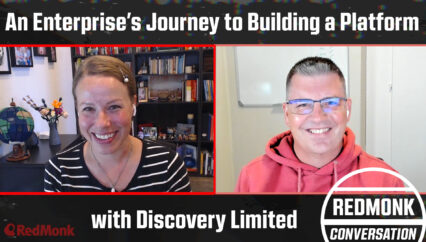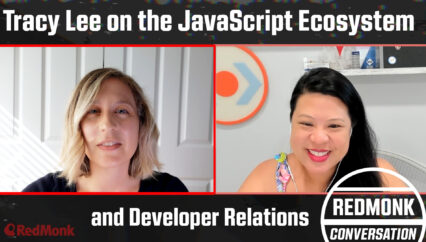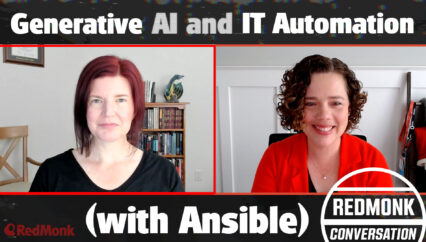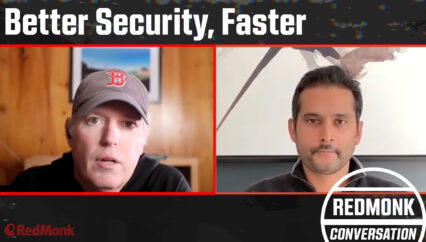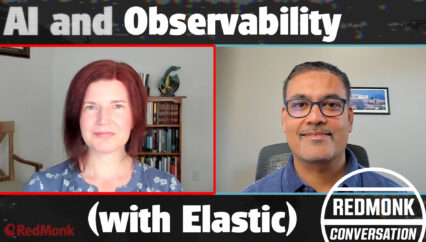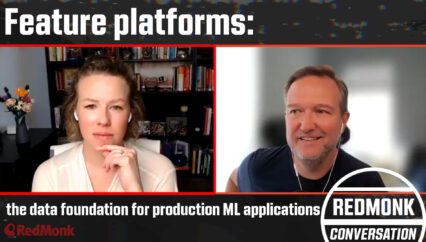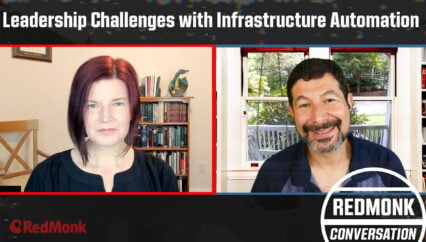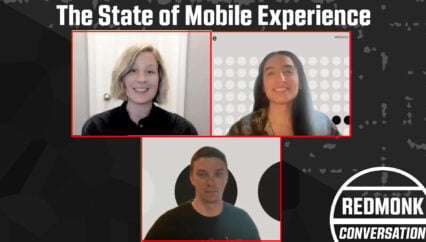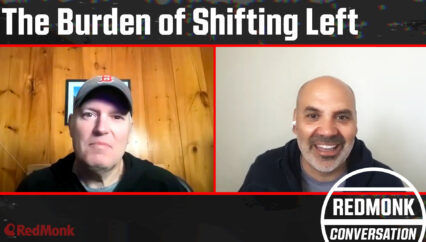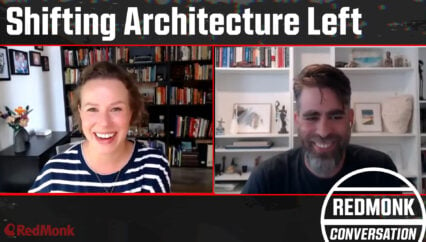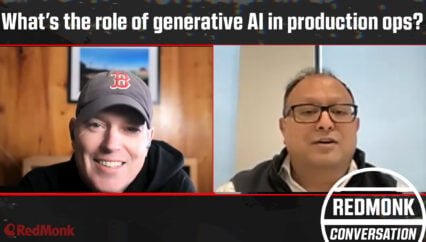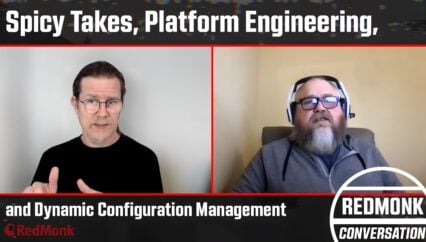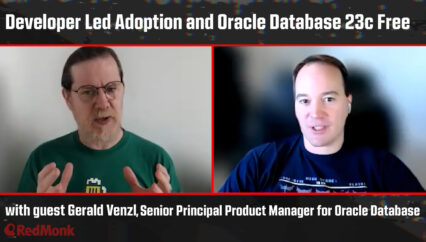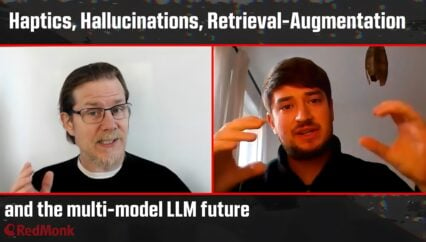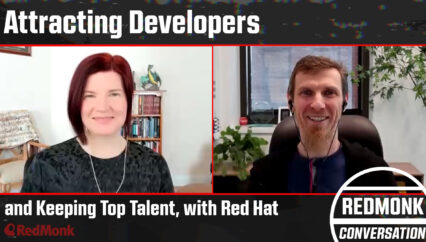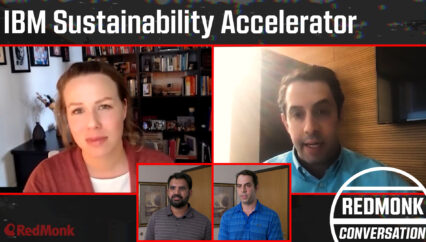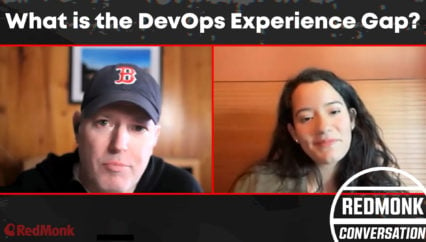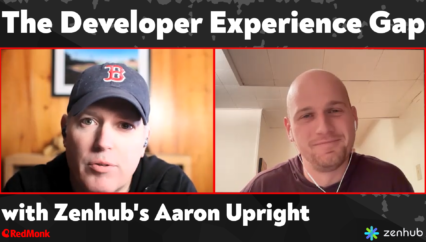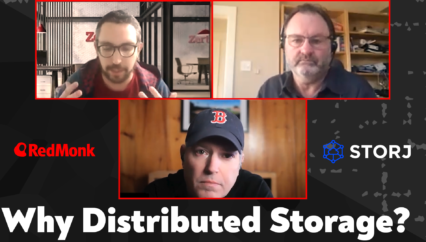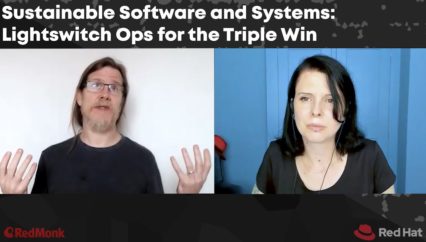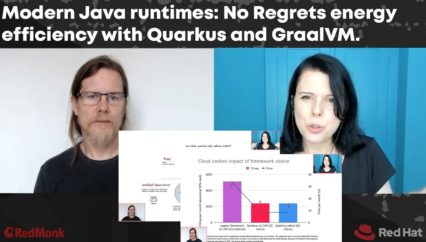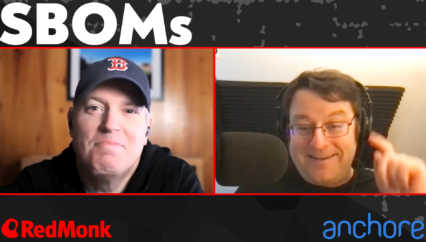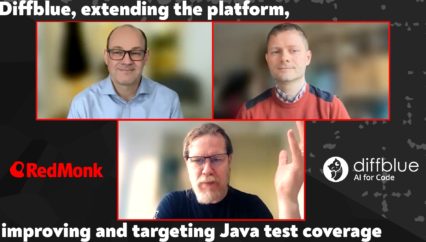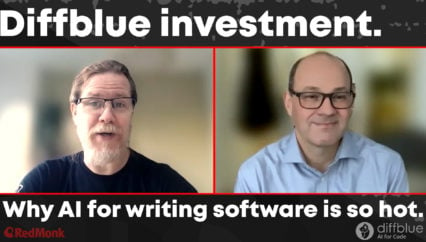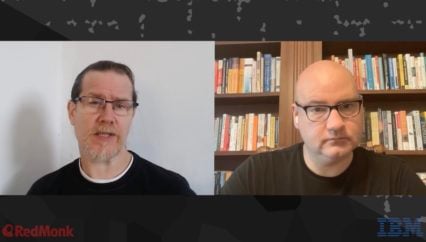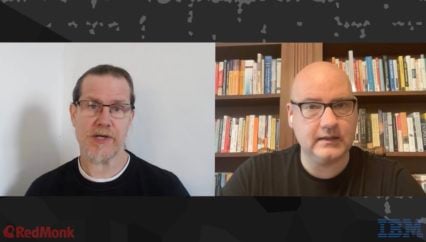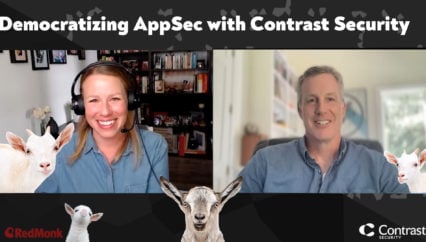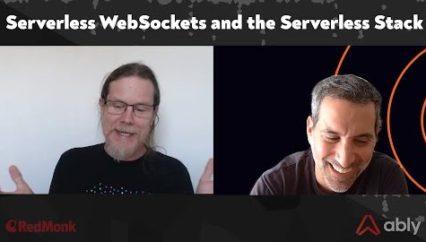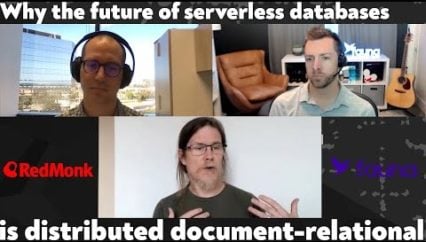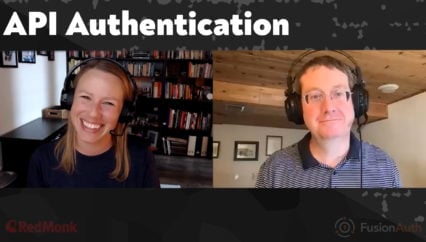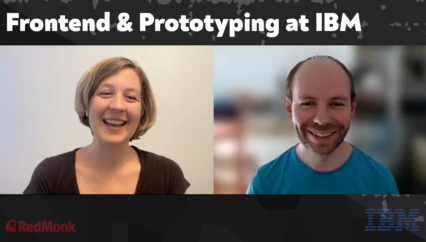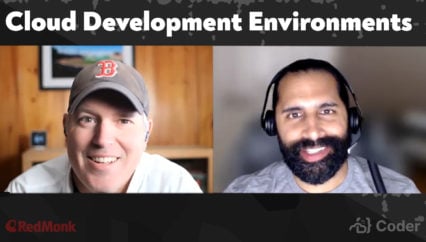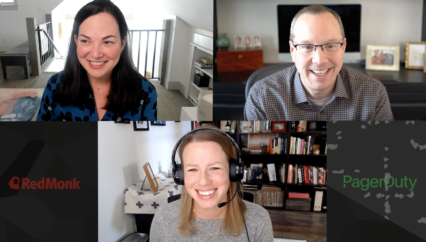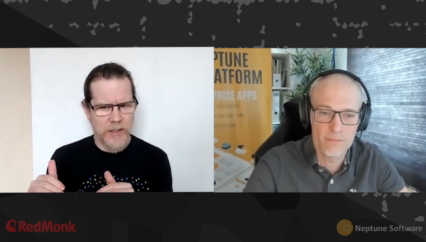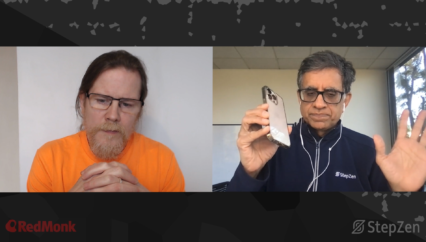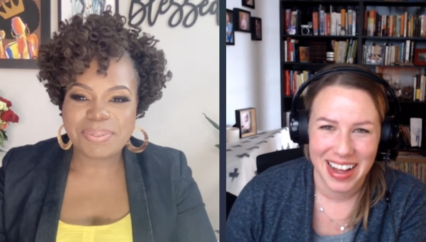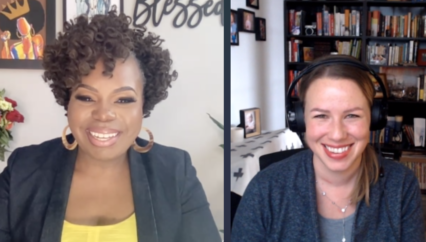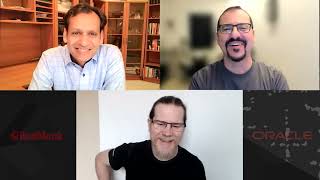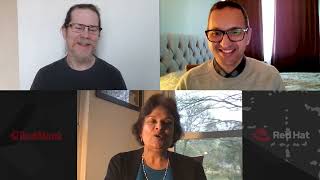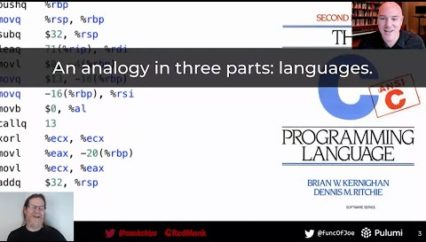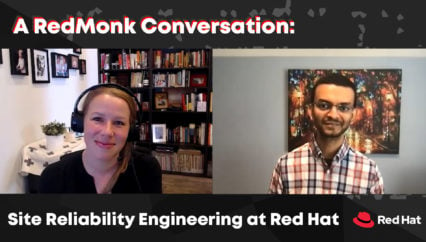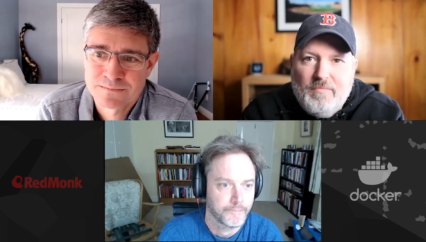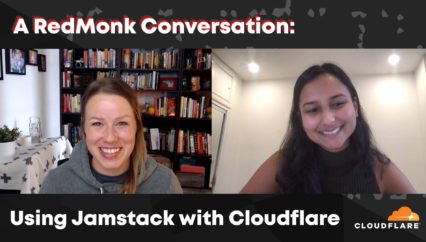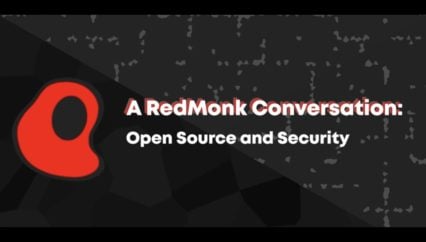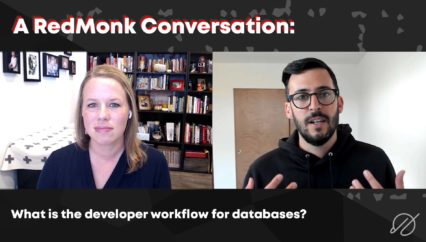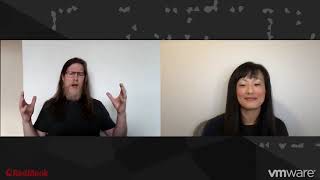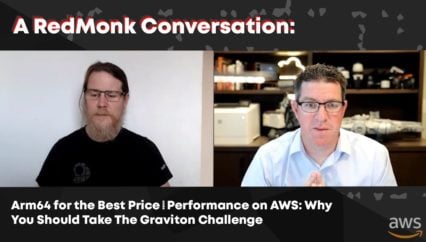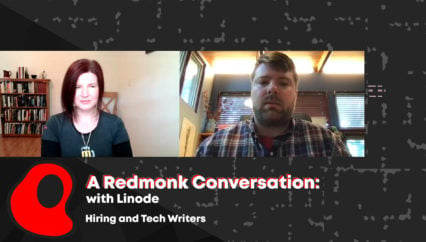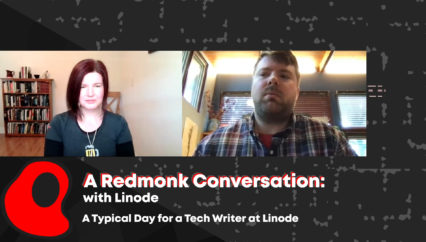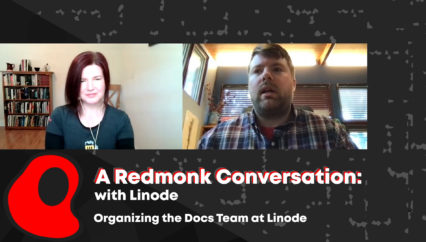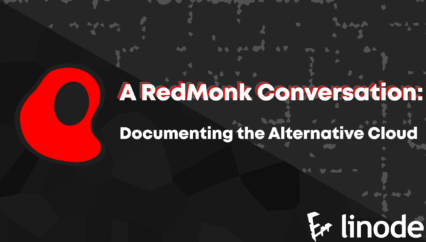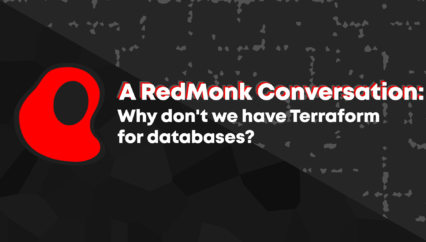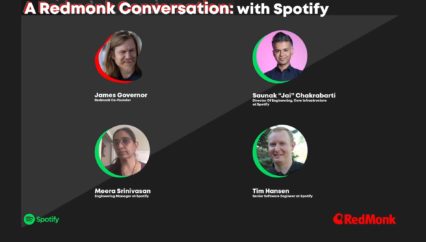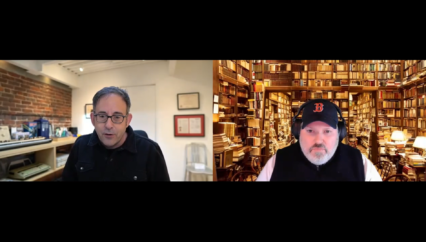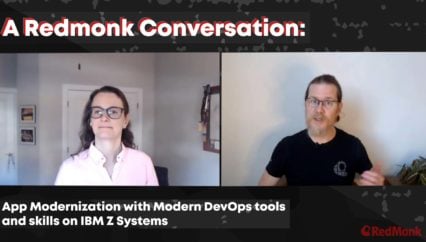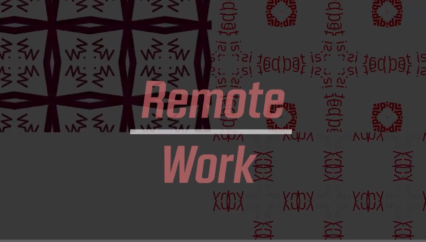In this RedMonk Conversation, analyst Kate Holterhoff chats with Vincent Mayers, who works in Community, DevRel, and Productivity Engineering at Gradle. They discuss the challenges and opportunities afforded by arranging tech events, focusing particularly on Vincent’s experiences organizing the Devnexus and Connect.tech conferences, as well as the Atlanta Java Users Group (AJUG).
This was a RedMonk video, not sponsored by any entity.
Rather listen to this conversation as a podcast?
Transcript
Kate Holterhoff: Welcome to this RedMonk conversation with Vincent Mayers, a man who wears a number of hats and frequently cowboy hats. Vincent works in Community, Devrel and Productivity Engineering at Gradle. He also organizes two local developer conferences in Atlanta, DEVNEXUS and Connect Tech, as well as the Atlanta Java Users Group, frequently referred to as AJUG. This group meets monthly throughout the year. Vincent, I appreciate you taking the time out of your clearly incredibly busy schedule to speak with me today.
Vincent Mayers: Sure, absolutely delighted to.
Kate: Alright. So let’s begin with some background on your career. Can you give us a breakdown about some of the highlights?
Vincent: Oh, God. Well, so despite working in the tech industry for a number of years, I’ve actually got a degree in pottery. I went to art school for four years, mainly because I failed math in high school and had to retake it. So instead of going to university to do civil engineering, I kind of rejigged my whole high school thing and went from engineering, maths and physics to geography, art and ceramics, and then spent four years at art school. And that’s only part of the story, I guess. But, after that, I got into the tech business because I was a tech recruiter for almost 20 years, and I moved to Atlanta in 2002 to start a company with some friends, moved from London, and I’ve never been back. But we sold our company in 2013 and I started working more in community roles, you know, within the tech ecosystem.
Kate: Alright, exciting. Okay, so I think I understand why you focus on the Java community, but is there some sort of part of your your work history that really led you to be interested in that group in particular?
Vincent: There is. So the recruiting firm I started, we kind of ended up branding ourselves as a specialty Java recruiting company. And around 2004 J2, Java two Enterprise Edition was kind of blowing up and all the clients were asking for engineers that had this this stack experience. So I started to sponsor the Atlanta Java Users Group as a way to get our brand out there to meet more people in the community — potential, you know, consultants and candidates, potential customers and learn more. I knew that I was not a technical person, but I understood the importance of understanding a technology stack and what all the acronyms were and what they did and who made them and why they worked and what worked together and so on. So it was a great way for me to learn more. So then I just stayed with it. And over the years, then I stopped being a recruiter. But I guess I fell in love with the Java community and always stayed involved with the Java user group.
Kate: And that’s what I’m really interested in. What is it that makes Java developers so special in your mind and what makes them tick?
Vincent: Well, because of my work and you know, I’m involved in other communities too: JavaScript communities and other ancillary communities, and we’ve run events around these over the years. I’ve just found it one of the most welcoming and accepting and helpful communities out there. It doesn’t seem to matter what age you are or how much experience you have. People in the Java community, that I guess are at the front of it — the people that speak at events and organize events and work for companies where part of the role is to be public facing, they’re just the friendliest people and most helpful people ever. I guess there’s various reasons and perspectives on that. But compared to other tech communities, there seems to be less drama, if you will, maybe more adult supervision. I don’t know.
Kate: Are you the adult that’s supervising or are you the one that makes sure that everyone’s chill? [laughs]
So on the AJUG website it states that the meetups typically focus on education discussion and topics related to the Java ecosystem. So can you share some of the topics that your friends are talking about right now? Where is most of the excitement in the Java community?
Vincent: Well, Java 21 is about to come out. So there’s a lot of buzz around that. I think it’s the next month, just under a month, I think it goes out. And there are various features in that like, you know, Loom, that have been in development for a long time that are more mature. But you know, in terms of our meetings, we have to try and strike this balance when we run these monthly meetings between, oh, here’s the nice new cool shiny framework tool or whatever that does this, that or something else everybody wants to talk about. I rarely mention it, intentionally. We also have to focus on the fundamentals, the basics, if you will, because there are many people that work in these large companies on these huge projects that, yes, it might be very interesting to hear about the latest features in Java 21, but you know, they’re still on Java 8 or 12 and they need to focus on on how to do things that make their day jobs better and easier. And these are things they may have learned when they studied first. But I often find that, you know, if you’re ever in a situation where you’re in a meeting or a seminar or something or you’re watching video, you go, Oh, yes, I know that. But now it’s top of mind again. Yes, we should do more of this. So we try and focus on fundamentals as well as the shiny new thing.
Kate: That makes a lot of sense. I mean, the other question that I have is for folks who are a little intimidated by these meetups, what would you say to them? You’re saying it’s a welcoming community. Is there any concern from the folks that you talked with about trying to become more involved with AJUG or any sort of technology community?
Vincent: It’s like jumping into a cold swimming pool. There’s some reticence, but you’ve just got to dive in, you know? It’s like you don’t know what you don’t know. And I have sometimes people that it’s their first meeting or they come and say, well, I’d like to join the community. I’m like, Well, show up.
Kate: Just do it.
Vincent: Yeah, just show up. It’s free. You know, we provide food and we record the sessions, too, if you want to watch them later. And there’s just a good group of people and you never know who you’ll meet. You might meet your new best friend. You might meet your next boss, you might meet your next hire. So just just come and join in.
Kate: Yeah, that’s huge.
Vincent: There’s no barrier to entry other than get out of the house.
Kate: Right.
Vincent: Well, there’s actually a barrier to entry these days.
Kate: Well, yeah. I mean, actually, that kind of segues right into what I wanted to talk about, which is, you know, the challenges that you’ve encountered with the pandemic. So what would you say the Covid 19 pandemic caused a lot of meetups and conferences to — core organizers were forced to rethink these in-person events. How did the pandemic affect AJUG and DevNexus, Connect.Tech? What was your sort of approach to grappling with this huge shift in how we interact with other developers?
Vincent: Well, we shifted virtually very quickly. We’ve never missed a meeting. I mean, I’ve been involved since 2004. The users — and let me be clear, it’s a users group, not a user group. That’s the terminology. I think the inception was like probably ’96 or ’97 and we never missed a monthly meeting. And it’s always on the third Tuesday of the month and it’s always in the same place. That’s also something that’s intentional. So hopefully people are on autopilot, per se. But the pandemic did — there was a bit of a paradigm shift. Yes, the virtual thing it was — I detest virtual events because I’ve run so many virtual conferences now and meetups. I don’t really ever want to do them again or a hybrid thing even. But on the plus side, they are very accessible and very inclusive. So when we did do this thing virtually, and a lot of meetups haven’t gone back to being in-person because it is a lot, believe it or not, to run a thing once a week. That’s a lot that goes into it. Or once a month rather. You used to get people from all over the world that were joining over Zoom and we’d have the chat and then what we would do after the presenter had finished presenting is, is we’d all just hang out on Zoom for a bit until people wanted to go.
And sometimes that was five minutes. I mean, other times it was like a couple of hours. But we would get people from all over the world that would join in so that again, the virtual thing does make what you’re doing more accessible and more inclusive because you don’t physically need to be there. But you know, rolling it forward, we started to go back. When did we go back? We probably went back to in-person right after everyone got vaccinated in 2021. Well, when they were available, probably in the fall. And then we put on hold again because of new strain number, or whatever it was for a couple of months. But what we found is that people’s behaviors have changed over the pandemic. And now, companies have the infrastructure and the process for people to work from home that wasn’t there before. You know, we’ve all heard this, three years of digital transformation happened in like three months. Very, very true.
And a lot of people that had never — I’ve worked for remote for like ten years. It wasn’t really anything new. But a lot of people had never done this before and had no idea how to do it productively. So now people are used to working from home, current times. And not every software engineer is now back in the office. They might be fully remote still or they might be hybrid. The percentage that’s back in the office is probably relatively small, full time. So what happens now is, in the past, people would leave work and they actually might stay a bit later at work, and then come to the meetup at 7:00. That’s when we start. And then it’d stop and then we’ll go home. Nowadays, people, for the most part, have to leave home to come to the meetup or the meeting, the monthly meeting. And in the rush hour, the worst time of day. And a lot of times with all the best intentions in the world, you get to like 6:00, okay, I need to leave now to drive to where the meeting is and oh, but let me just finish this email or a work call runs long or the dog gets out and he’s running down the street or it starts raining or I’m just too tired and then you don’t go. That’s what’s happening a lot these days.
Kate: Yeah, I’ve heard something similar. Yeah. In my case, it’s usually toddlers banging on the door outside of my office or contractors trying to stop by to take care of a necessary home repair.
Vincent: Or it could just be you have to put pants on for the first time today. .
Kate: Oh, we’re not even getting into pants. [laughs] All right. So I want to talk a little bit about your DevRel hat at this point, because I think something that’s really been interesting to me is this dichotomy between like, leadership and mentorship and how we can lead and but ensure that developers have the freedom to do what it is that they need. And so this really came out of a conversation I had with some folks at the Apache Software Foundation. So Christopher Dutz, we were talking about the ASF’s governance model, and so I was really interested in this idea of the independence of these projects, right? And he got me thinking about the challenges, especially in open source communities. But I think, you know, in most developer communities where there’s this sort of stereotype that developers, they want to focus on their IDE, their terminal. They don’t want to be bothered by managers, right? But at the same time, devs crave this sort of connection with folks that they can nerd out with, like you and the AJUG friends. So all that is to say, there just seems to be this difficulty, you know, developers are almost like hothouse plants, right? Where you really have to just find this balance to, to ensure that they’re happy with the communities that are being created for them. And they’re not like, you know, being told what to do. But at the same time, they have this sort of structure to really thrive. So can you talk at all about your experience as a sometimes community member, sometimes community leader and DevRel professional? You’ve been doing this for a long time. How do you find that balance between leading and allowing the community to form in ways that seem natural to it?
Vincent: Well, I think most the people that are actively involved in communities are outliers anyway.
Kate: Okay.
Vincent: Sometimes in the context of a Java users group, how do we get people there? Okay. Because sometimes the people that would benefit most from the meetings are the people that that, you know — it’s always just, they go and write code, go home. And they’ve never really heard of open source much or don’t really necessarily know how to contribute or never really thought about it. Those are the people who benefit most from going to these meetings, but how do you reach them? And it’s an age old question that all user group leaders, whatever the community is, face. I had a recent example of a lady I met at an event and she was from Seattle and I said, “Oh, do you know Freddie? He runs the Java User Group.” And she said, “No.” She said, “the what group?” I said SeaJUG. Seattle Java User Group. “Well I didn’t know there was one.” And she’d been there for ten years. She was a senior and worked at some of these major enterprises and had no idea it was there.
And I find that, and I was asked this myself at another event in a Q&A, how do we get younger people out to these things? Younger Java developers. The challenge we have here is that they don’t know these things exist. The folks that go to meetings or do any kind of thing on open source are outliers because they already understand that it’s there. And even that subset though, how do you get those folks out from their open source projects? Maybe go to the Con. Apache Con, or now Community Over Coders, it’s going to be called from now on every year. Maybe they do that, maybe they don’t. But they love plugging away on Apache Beam or whatever it is they’re working on. How do you get them to do more other than just that technical thing because you know they’re interested in it. It’s difficult. It’s really difficult. I don’t have an answer.
Kate: Yeah. I don’t know that anybody does. But that’s why I think it’s interesting because, I mean, it sounds like you’ve really devoted your career and your hobbies — I mean, I guess maybe we should have talked about this earlier, but, what is the distinction between a users group and sort of a more general meetup or maybe a vendor community or an open source — like what is a users group offer that is so unique?
Vincent: I think in the Java world they started out becoming being SIGs, Special Interest Groups. In fact, one of the larger ones in the US, the New York Java group is still the NY Java SIG, NY Java Special Interest Group. And then the SIGs kind of evolved into users groups I guess as the language and platform became more mature and more people getting involved and wanting to collaborate on various things. And a leader in the community steps up and says, Hey, I’m going to run this because it’d be cool to do it. Maybe my company will sponsor a room or some pizza or something like that. Maybe we can get other sponsors if we put their logo on our website. Not every users group has a website. Meetup has kind of taken over as one of the de facto repositories for all these meetings. And the number of organizations that have their own website is declining. And in fact, if you started one, why would you even write your own website? Just create a group on Meetup as a way to get the word out to people that there’s something going on every month. Maybe try and take advantage of meetups, organic SEO, which is substantial. So I guess it kind of makes sense. But is there any difference between — I think there’s a difference in drivers.
So I’ve seen meetups that are directly sponsored by, I call them OEMs. There’s some disagreement about whether or not an enterprise software company that makes a database or makes a language or a platform is an OEM. But that’s what I call it because that’s what it is in my head.
Kate: Okay.
Vincent: Their drivers for putting these things on are well, the people that actually put them on or organize them, they’re pretty altruistic, I think. But the companies’ drivers for supporting them are pretty self-serving. They want exposure to this group of people for their brand. And there’s really nothing wrong with that as long as they’re not using it as a vehicle for, you know, elevated product pitches and things like that. Some companies do it just because they feel it’s the right thing to do to gain brand awareness for whatever it is they’re doing. And some it’s just like, well, you know, we can we can get more leads, if you know what I mean. But at the end of the day, all of these things, a users group, a meetup, SIG, whoever they’re organized by, they always revolve around the efforts of 1 or 2 core people and the passion of 1 or 2 core people. And if those people kind of move on or get other responsibilities, then sometimes it just goes away.
Kate: Yeah, I get that impression. I think that’s why that question of leadership really resonates with me, because I think when I talk to folks, especially those in the open source community, there’s so much emphasis on the community aspect of getting as many voices as possible, bring everyone in, right? We really want to make this something that serves everybody, that this is accessible and the whole thing. But then I often hear that, yeah, it’s like it’s really driven by these folks who have just committed so much time to it because, yeah, the amount of work that goes into this, I can’t imagine. And I don’t know how you do it. I guess so this helps me to get to the question of how you would mentor prospective organizers. How is it that you tell folks who are interested in becoming the catalyst for starting a new group or maintaining one or just becoming more involved in the leadership component of one of these organizations. What advice would you give them other than just like, you know, you might have to quit your day job and this is going to take up every hour of your free time.
Vincent: No, I guess the overarching thing is just being intentional.
Kate: Okay.
Vincent: So none of this happens by accident. And actually I like to talk a lot about intentional — software engineers understand eventual consistency. Basically it’s all going to happen the same way. I like to talk about intentional consistency, but it doesn’t just apply to user groups, it applies to anything in life, right? And in the context of our technical conversations in user groups and meetups, etcetera. But at being intentional about, again, what goes into running just one meeting once a month, what do you what do you have to have necessarily? I mean, you need a speaker and you need a space and need a time of day, if you will. And those are really the only three things that you need. But those three things are sometimes really hard to get all at the same time every single month. It requires effort because you’re relying on… we’re a little different because we pay for our space and we can do that because we run an event. Most users groups or meetups don’t have that and they’re relying on a company to provide them a space. And that works out really well sometimes until it doesn’t, because we’ve been in that situation where, I’ve seen this happen, rather, where you’re reliant on a sponsor not necessarily giving you money, but they’re letting you use their facility, which you might have done successfully for some years, but all of a sudden, oh, well, you know, we’ve just changed our policy or the CEO needs the room for this tonight or we’re renovating or whoever it is that you’re interfacing with, leaves to another company, and there’s no one else to pick it up and it just goes away.
So it’s sometimes very hard. And then again the speaker, and you try and think about, okay, well, all right, we don’t have any money to get someone to speak. We need people from the community to step up and speak. And that is often a good way for those folks to get on that kind of speaker train, if you will. You know, how do we reach them? If I’m going to find speakers in a new community, what would I do? I’m going to go to LinkedIn and look up Java and engineer and see who shows up. That’s what I would do. But yeah, it’s a level of intentionality about it. And to get it to the point where it’s kind of self-sustaining is a lot. And then to sustain it is still a lot.
Kate: Yeah. I’m exhausted just thinking about it. But I mean I can see how important it is to the community here. I mean, I did attend DEVNEXUS this spring and I was really inspired by the amount of enthusiasm for Java and just for the fact that Atlanta has such a strong, robust community here. And I think that, you know, you and your co-organizers are really to thank for that.
Vincent: Yeah that event has been going for some time now. But 2020 was probably — the attendance was at its height at about 2400. So it’s not huge compared to re:Invent, you know, Amazon re:Invent or something, or whatever Salesforce does. But that’s a lot. I mean, for us, it’s a lot. Our goal is never to have this massive thing, but just do the best one we can. And then of course, we took a hit, you know, during the pandemic, and it’s building back up to that. But Atlanta, there’s a lot going on here in terms of technology. And even just with Java, if I think about just two companies that are here, AT&T and the Home Depot, probably there’s probably 4000 Java developers just between those two companies.
Kate: Wow.
Vincent: Yeah, so I think Atlanta has a very high percentage of the Fortune 500 that are headquartered here. It’s ridiculous. Oh yeah, because there’s the schools and Georgia Tech and all that. Students never come, by the way. I’ve tried unsuccessfully over the years to donate tickets to Georgia Tech, they’re not interested. If Georgia Tech’s watching, why? Really? I guess I can’t find someone to pay attention.
Kate: That’s really interesting. I mean, that’s what brought me to Atlanta. I did a postdoc at Georgia Tech. So, I wish I’d had known at the time. I’d start making it extra credit for my classes.
Vincent: I met the young gentleman that ran some kind of Java community there once at a party. And we had a great discussion about, hey, you guys can get involved in the users group, you can get involved in the conference. We’ll give you tickets to the conference. Never heard from him again.
Kate: Wow.
Vincent: Maybe they graduated and moved on. I don’t know.
Kate: Hard to say. All right. Well, that’s you know, this is your roadmap. This is goals. This is, you know, 2024. You got it all figured out. Break into Georgia Tech. [laughs] All right. So as we’re wrapping up here, if folks are interested in participating in the groups and events that you help organize, where should they look for more information, Vincent?
Vincent: Well, I want to say, even though we have websites, the Atlanta Java User Group is ajug.org And DEVNEXUS is devnexus.com. So those are the two things that the Java User group does. We also run what’s become the largest multi framework front end conference in the country, connect.tech. That’s the url. CONNECT.TECH In Atlanta. This is the 11th year I think, in October. So if people are Fullstack developers or any kind of flavor of JavaScript, they could check that out.
Kate: Excellent. All right. Well, I want to thank Vincent for joining me today. I will provide links to these organizations and events that he mentioned in the show notes. And I look forward to seeing you representing RedMonk at CONNECT.TECH This October. So thank you.
Vincent: See you there. Nice to see you. Have a good weekend.
